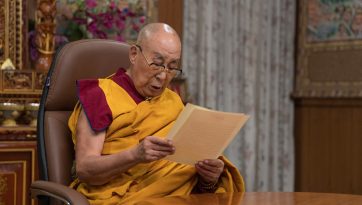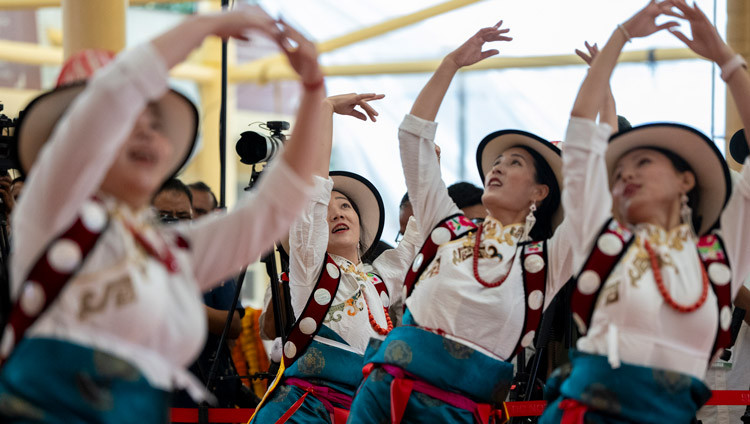Press Conference for the Global Launch of SEE Learning
April 4, 2019
New Delhi, India – His Holiness the Dalai Lama is in Delhi for the Global Launch of the Social, Emotional and Ethical Learning (SEEL) program developed at Emory University, Atlanta, Georgia, USA. However, to begin with today, he met with Venkat Krishnan the founder of Daan Utsav – Festival of Giving – who requested him to give a message to all who will participate in the Joy of Giving Week 2-8 October this year. Krishnan told him, “We want people to realize that having compassion for others doesn’t make you sad, it makes you happy.” His Holiness replied, “We are social animals who biologically need karuna or compassion and as long as we have compassion, we’ll be physically and mentally fit. This is something scientists now recognize. Encouraging more people to experience this is the best way to create happy individuals, families, communities and in fact a happier humanity.
“The Joy of Giving Festival is important because during that time we are reminded of karuna; but actually we need to keep it up the whole year round.”
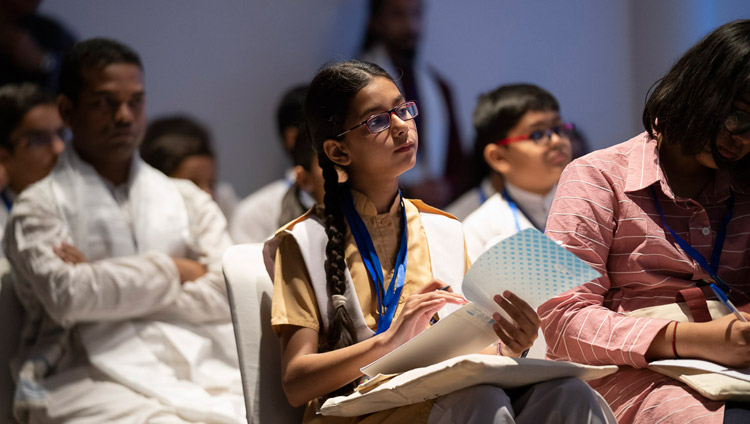
Next he met with about 80 students and teachers from South Asian countries, who represent 300 students who have been taking part in workshops about universal values and secular ethics. Rajiv Mehrotra, Secretary of the Foundation for Universal Responsibility, which has organized the workshops, gave an introduction.
He said the aim had been to strengthen young people’s capacity to develop compassion, universal responsibility and a respect for diversity. Students from South Asia were encouraged to embrace positions that were acceptable to faith traditions and agnostics alike, engaging with issues across religious and ethnic divides. He pointed out that because of differences in individuals’ receptivity immersion programs were necessary to enhance transformative change.
Mehrotra described education in inner values as a lifelong process and suggested that schools and colleges can function as places of healing that can prevent the growth of hatred and fear. They can instead become places of true development.
“When I received the Nobel Peace Prize,” His Holiness responded, “I gave half the prize money to Baba Amte to support the excellent work he was doing to help lepers in his ashram. The other half I gave to the Foundation for Universal Responsibility and asked Rajiv to take action—with this program, among others, he has. Young children don’t care about differences of religion or nationality. But once they enter the education system they learn to emphasise such differences. Meanwhile, education today doesn’t have much to say about inner values.
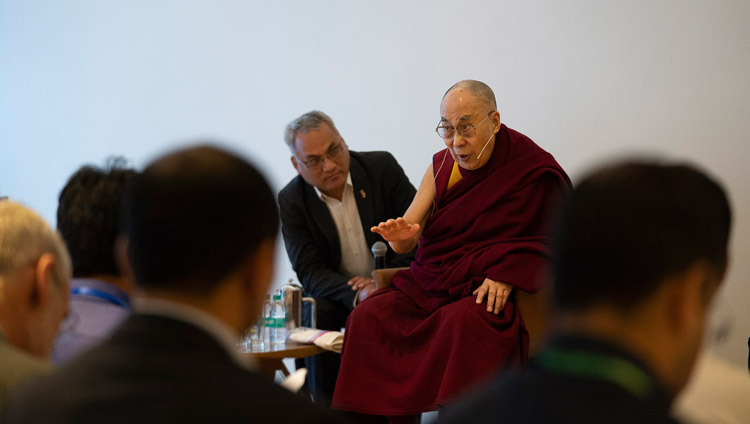
“Nevertheless, this country has longstanding traditions of ahimsa and karuna, non-violence and compassion. And the practices of shamatha and vipashyana have given rise to an understanding of how to train the mind. Modern education does a wonderful job of providing for material development, but neglects this other aspect of human knowledge.
“Much of the suffering in the world today is of our own creation. Everybody wants to be happy and no one wants to be miserable. Having a few people exercising power and exploiting the majority is a hangover from feudal times, and yet we live in a largely democratic world in which power belongs to the people. In such a world it’s immoral to order others to go and fight. Differences between people need to be solved through dialogue because we live in a global community. We take part in a global economy and we all face the challenge of climate change.
“Discarding weapons, we must adopt a non-violent approach following the Indian traditions of ahimsa and karuna. We need to learn from kindergarten onwards how to tackle destructive emotions and how to combine an understanding of the workings of the mind and emotions with modern education. If this can be achieved in India, others may follow.”
His Holiness told a young Afghan woman who wanted to know how religion can help us work for peace that the key lies in education; that is what will be most effective. A young man from Kathmandu, Nepal heard that acting with compassion counters loneliness and makes you happy. A Bangladeshi student learned that since negative emotions are based on ignorance, the remedy is to develop wisdom understanding reality. His Holiness advised a young Sri Lankan woman that sometimes following secular values is the most effective course.
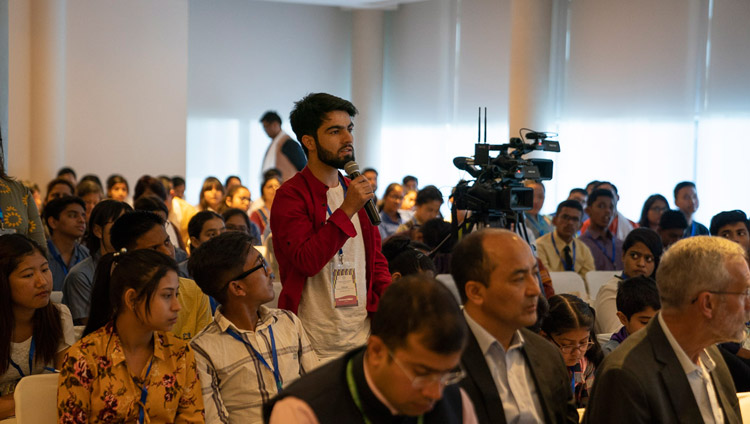
When a young Kashmiri asked the spiritual meaning of freedom, His Holiness noted that the problems in Kashmir arose out of the partition of the country. He recalled historical links between Tibet and Kashmir. “Keep up your determination,” he advised, “but don’t get too bogged down in emotions. Be realistic. Look at problems you face from different angles. Try to distinguish appearance from reality.’
His Holiness advised a young woman from Manipur, North-east India, who wanted to know how cultivate peace within herself, to read Shantideva’s ‘Guide to the Bodhisattva’s Way of Life’. He told her to pay attention to the instruction to exchange selfish attitudes for concern for others because if you remain selfish, others will seem like adversaries, whereas it’s much better to see them as friends. The meeting concluded with a representative from Sikkim making an offering to His Holiness on behalf of the group.
Shortly after he entered the room where members of the press were assembled, His Holiness’s old friend Richard Moore arrived. Referring to him as ‘his hero’, His Holiness explained that Moore is a living example that human nature is compassionate. He recounted that as a young boy in Northern Ireland Moore had been struck by a rubber bullet and rendered blind. In due course he found the British soldier who had shot him and forgave him. As friends the two have worked to help other children caught in crossfire.
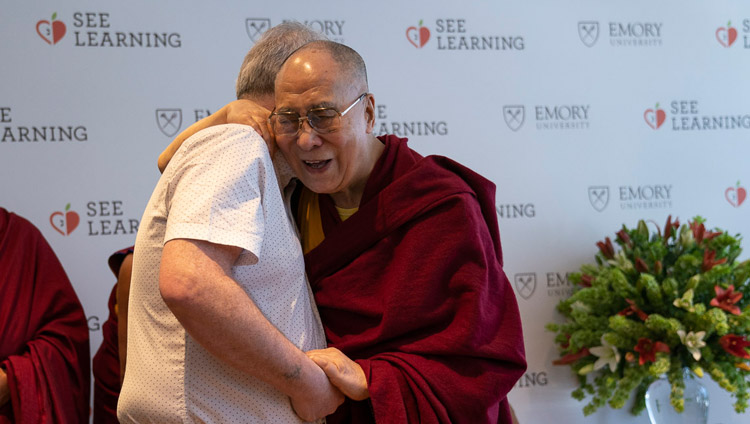
Answering questions in Tibetan from Voice of America, Radio Free Asia and Voice of Tibet correspondents, His Holiness told them that the practices of loving kindness and wisdom that are part of the Nalanda Tradition are something to be proud of. They are kept alive through study and practice as can be seen in the Seats of Learning re-established in South India.
Dr Brenda Ozawa de Silva, moderator of the press meeting, gave an introduction in lieu of Dr Lobsang Tenzin Negi. He mentioned that His Holiness’s relationship with Emory University goes back to 1998 and the launch of Cognitive Based Compassion Training (CBCT). Later, there was collaboration is developing science training for Tibetan monasteries. SEE Learning is the latest program which seeks to provide a comprehensive approach to holistic education. He invited His Holiness to make his remarks.
“The existing education system is inadequate,” His Holiness replied, “with no guarantees that it will bring happiness. Education should include ways to reinforce warm-heartedness. All religious traditions convey such a message, but in today’s world at least 1 billion have no interest in religion.
“From kindergarten upwards we need education to strengthen inner values not just pursue material goals. We need to introduce steps towards emotional hygiene, much as we teach physical hygiene. This way we can address some of the problems we face, in the hope of making this a century of non-violence.”
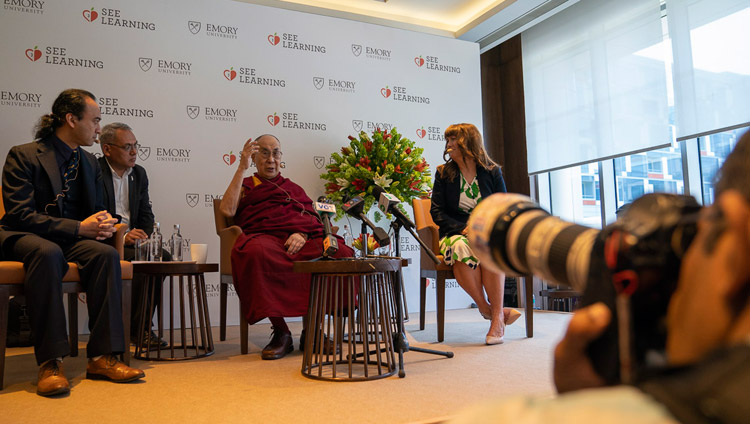
A key advisor, Dr Daniel Goleman, addressed the gathering via a videolink. “I’m sad not to be there with you,” he began. “When I wrote ‘Emotional Intelligence’ I discussed self-management, in SEEL this has become cultivating emotional hygiene, reducing negative emotions and boosting positive ones. This involves education of the heart, attention training and the development of compassion.
“I recently was struck to see a group of young children each of whom had a toy animal, who at a given point in their class time lay down with the animal on their abdomens. They watched and counted as the animal rose and fell with their breathing and so developed calm and control. This kind of technique has far-reaching effects on the children’s ability to learn and equalizes their potential.
“A combination of wisdom and compassion is what the world urgently needs right now. For the human species to survive will require a mixture of compassion and teamwork. I congratulate Your Holiness on achieving SEE Learning after 20 years work.”
Next, Ms Linda Lantieri from Columbia University addressed the meeting by videolink. “I have had a long involvement with the SEEL program that goes towards an education of the heart. We need such a non-violent approach in the world today. We are going to see a transformation in children being able to develop their hearts as well as their minds. They will have inner resilience enabling them to prepare for challenges and opportunities.”
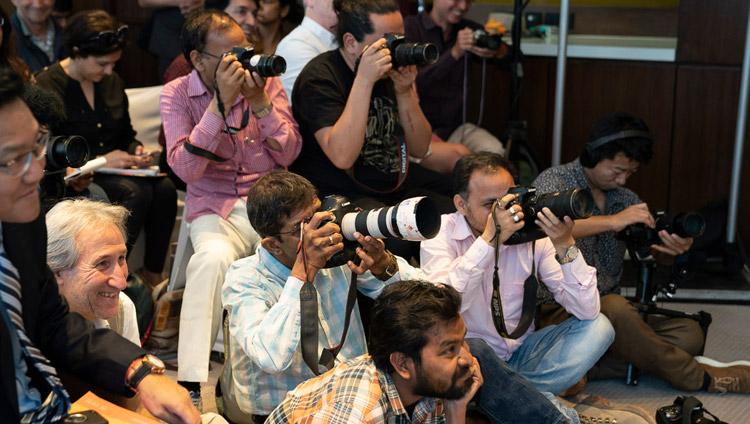
To illustrate this she told a story about a group of teenagers she’d been working with in a poor part of New York. All of them had lost a friend or relative to violence. Their teacher asked them to share a goal for when they were 21 and she remembered one, Eugene, who said, “To be alive at 21″. Not long afterwards the teacher called her with sad news about Eugene. He’d been shot from a passing car and would never walk again.
When she went to visit him in a care facility she found him in a corner talking to a group of other wheelchair users. “I was telling some of the guys what you taught me,” he informed her. She asked how he was and he replied, “I’m good. When I woke up today, I decided to forgive the shooter and I’m feeling much better for it.” Self-regulation begins with the urge to make a difference. This gathering for the launch of SEEL will help the world, which will be so much the richer for it.”
Prof Dr Kimberly Schonert-Reichl turned to His Holiness, saying, “Your dream of an education of the heart is coming to fruition. These programs can make a difference. I started out as a teacher before I became a researcher and found I had nothing to depend on. I didn’t know what to do. Then I discovered that with SEL students are more likely to graduate and go on to other achievements. Richie Davidson has shown that these skills can be taught and can be seen to be effective in neuroplasticity. Now, SEEL with its education of the heart, compassion, systems training and attention training fills a gap—it’ll be so valuable.”
Among questions from the floor, the first was about why India had been chosen for the Global Launch of SEEL. Brendan Ozawa de Silva replied that the program was the result of a 20 year collaboration with His Holiness and this is where he lives. His Holiness added,
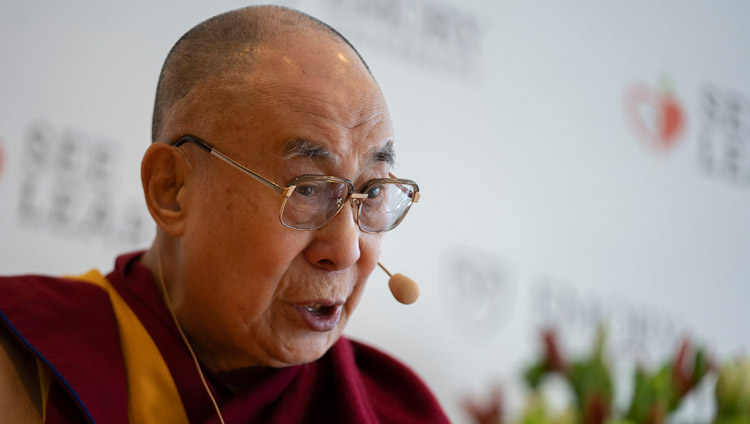
“Among the ancient civilizations such as those in Egypt and China, the Indus Valley civilization gave rise to a rich knowledge of the workings of the mind and views of reality. The Buddha as a product of Indian tradition. Nowadays, India has the potential to help humanity by combining ancient learning with modern education.”
Regarding devices like mobile phones, His Holiness stated that by itself technology is wonderful, but it depends how people use it. He observed that leaders tend to reflect the communities they come from. Since education today tends to focus on material development, it’s not surprising if that’s what motivates contemporary leaders. He suggested it can take a whole generation to change a community’s way of thinking.
“We are social animals—anger pushes us apart, but compassion brings us together. It’s such a shame that our wonderful human intelligence is squandered on developing and then marketing weapons that can only be used for destruction.”
His Holiness mentioned his admiration for Jacinda Ardern and her skilful handling of the situation after the recent attack in New Zealand. He appreciated her stance of non-violence and mutual respect, something everyone can learn from.
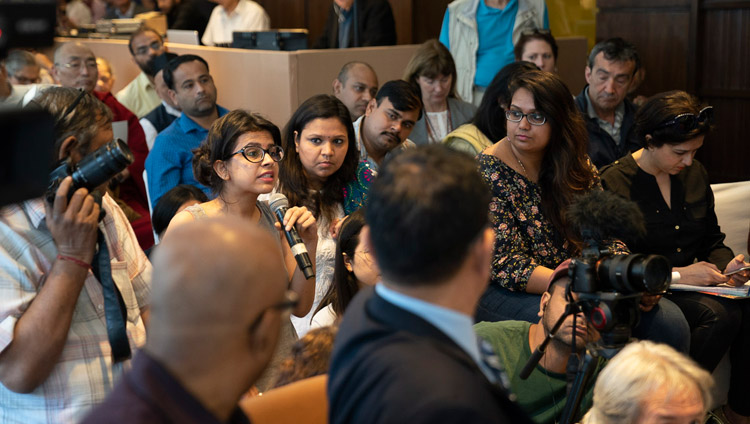
A questioner who wondered if interreligious harmony was as well-founded as His Holiness seems to think was told that he prefers to look at things from a wider perspective. He conceded that there are mischievous people everywhere and untoward incidents do occur, but they are infrequent. His Holiness cited the example of the Parsee community, Zoroastrians from Persia, who now number fewer than 100,000, but who live among millions of Hindus, Muslims, Christians and Sikhs in Bombay completely without fear—illustrating India’s tolerant pluralism.
With regard to his own reincarnation His Holiness suggested that if he lives another 10-15 years, the political situation in China will have changed. If, on the other hand, he dies next year the Chinese government may recognise their own candidate to succeed him. He expressed appreciation for the 1st Dalai Lama’s wish to be born wherever he could help relieve the suffering of others.
Tomorrow will see the formal launch of the Social, Emotional and Ethical Learning program.

